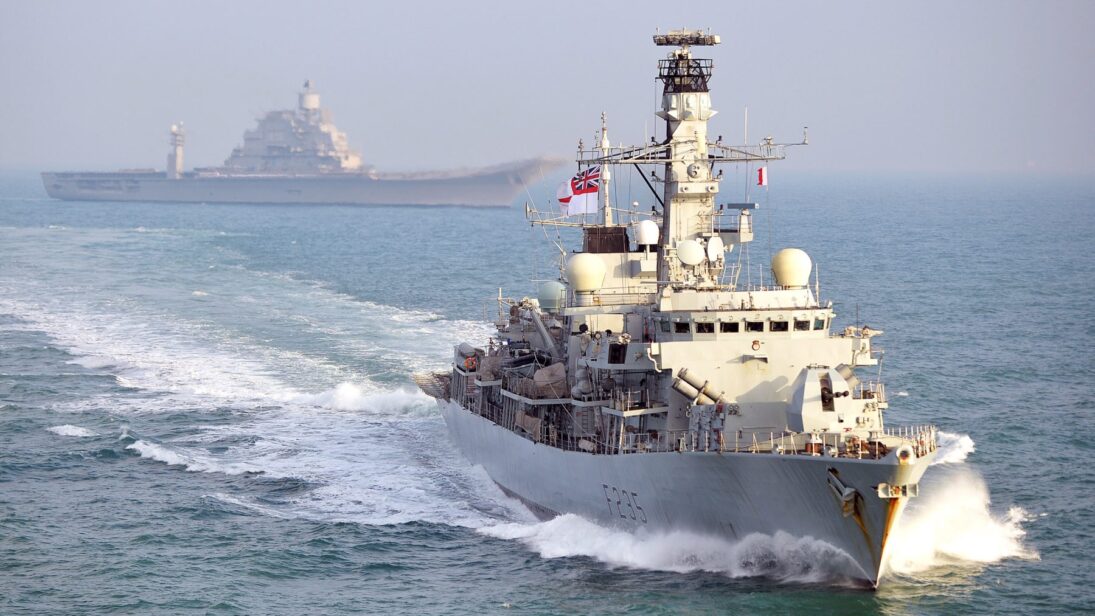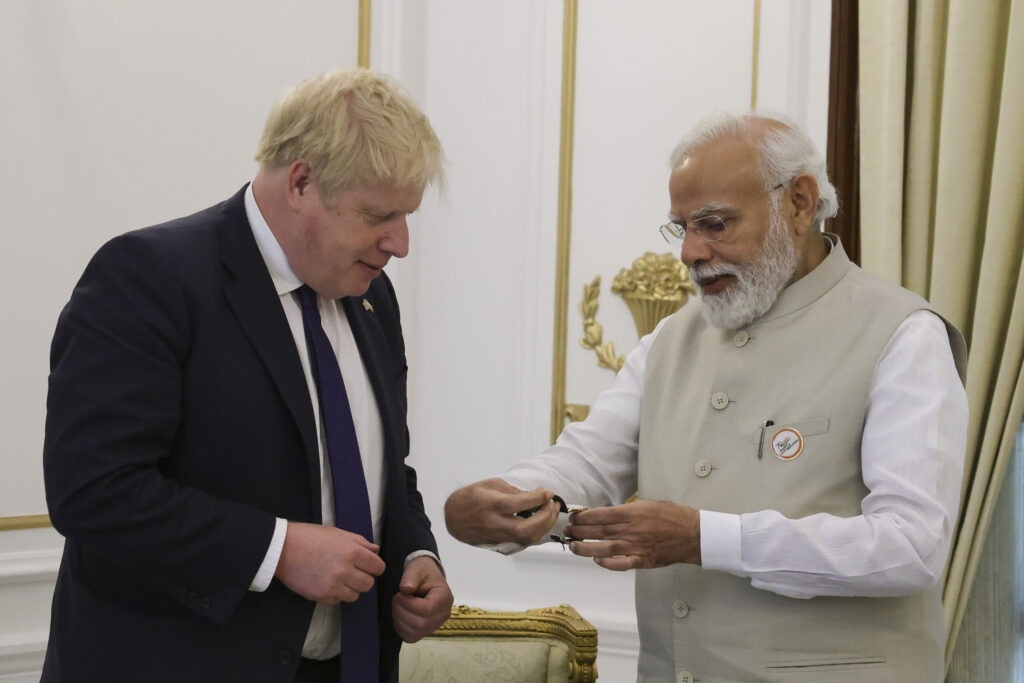
In March 2021, the UK Government published the Integrated Review (IR) of Security, Defence, Development and Foreign Policy, a landmark policy document defining Britain’s international role in the aftermath of the UK’s departure from the European Union. This is the first time the UK has formally outlined its Global Britain plan—the term was frequently used following Brexit but lacked clear objectives and priorities.
The Integrated Review places UK-India relations within the context of Britain’s Indo-Pacific tilt and demonstrates significant attention to the relationship. Repeated references to India and a two-paragraph section devoted to the relationship highlight the potential for cooperation in economic, scientific, and technological domains. India and the United Kingdom have also elevated their bilateral relationship to a “Comprehensive Strategic Partnership”, agreeing on a “2030 Roadmap” for strengthening ties in areas such as health, climate change, trade, education, science and technology, and defense.
However, as a result of Russia’s invasion of Ukraine, economic recovery from the pandemic, soaring inflation, and the refugee crisis, the UK’s capacity to deepen engagement with India and play a key role in the Indo-Pacific is severely limited. While the UK is capable of carving out a measured role in Asia, it has little capacity to serve as a major security provider in the Indo-Pacific. Attempting to do so may also risk diluting Britain’s role as the leading contributor to Euro-Atlantic security. While the UK’s Indo-Pacific tilt and emphasis on cyber, space, defense, and other areas are symbolic of the UK’s ambition, in reality the UK will remain most capable of addressing European security threats.
Do Britain’s ambitions match reality?
In search of its new global role, the United Kingdom is returning east of the Suez after fifty-years, while simultaneously attempting to portray a perception of renewed commitment to the region. Recent deployment of Carrier Strike Group-21 (CSG-21) to the Indo-Pacific demonstrates the United Kingdom’s commitment to expanding its defense engagement in the region. During its 28-week deployment in the Indo-Pacific region in 2021, the CSG-21 visited India, participating in a maritime exercise in July and a first-ever tri-service exercise known as Konkan Shakti in October, with the UK being the only third country with which India is undertaking a tri-service exercise.
While this deployment reflects a renewed regional commitment, there is a risk of exaggerating the tilt towards the Indo-Pacific and particularly in the Indian Ocean region (IOR). It is crucial for India to understand the United Kingdom’s interests in the IOR and the challenges the UK will face in realizing its ambitions.
The UK’s Indo-Pacific tilt is likely to remain largely focused on the Pacific as there was no mention of engaging with the regional organizations in the Indian Ocean.
First, despite the IR’s extensive references to the Indo-Pacific region, the United Kingdom has not released an Indo-Pacific strategy document, in contrast to the other major European countries. Moreover, Britain’s commitments are mostly in the Pacific with respect to the Five Power Defense Agreements with the ASEAN countries and the recently concluded AUKUS deal. As far as India’s approach to the Indo-Pacific is concerned, the Indian Ocean is the primary theater of operation, and the UK’s Indo-Pacific tilt is likely to remain largely focused on the Pacific as there was no mention of engaging with the regional organizations in the Indian Ocean.
Second, due to the current in crisis in Ukraine, it will be difficult for the United Kingdom to maintain a meaningful troop commitment in the Indian Ocean. The United Kingdom currently maintains seven permanent points of presence in the IOR: Bahrain, Oman, Kenya, Brunei, Singapore, Diego Garcia, and Qatar. It is unlikely to expand beyond these bases given the precarious reality of European security. In addition, the Gulf no longer serves as the exclusive source of energy for the United Kingdom, meaning London has less incentives to operate in the region today than it had during the twentieth century. A large portion of the UK’s oil comes from Norway and Nigeria, thus it is not reliant on the energy resources in the IOR.
Third, the UK is facing domestic challenges. England, Scotland, Wales, and Northern Ireland are more divided than they have ever been, due to regional economic disparities. The challenges are exacerbated further by rising inflation and economic recovery following the pandemic, as well as a recent shift in the political landscape in Northern Ireland, with the Sinn Fein party, which supports Irish reunification, winning a majority in the regional election. As a result, London will need to prioritize domestic issues over its ambitious Indo-Pacific strategy.
Fourth, Russia’s invasion has refocused the UK’s attention on European security, as the UK intends to play a leading role in arming Ukraine and bolstering NATO defenses in nearby countries. London is currently leading the Joint Expeditionary Force with six other smaller European countries and in the maritime domain, the Royal Navy plays a key role as NATO’s naval command is headquartered in London. A significant proportion of the UK’s naval resources will likely be stationed in Mediterranean, Baltic, and North Sea areas, limiting UK plans for Indo-Pacific expansion. Recently, U.S. Secretary of Defense Lloyd J. Austin reiterated this point, stating, “Britain might be more helpful as an ally if it did not focus on Asia.” With clear messaging from the U.S. military, the UK is likely to delay the realization of it’s the Indo-Pacific ambitions.
Finally, not all countries in the Indian Ocean are enthusiastic about Britain’s reinvigorated presence in the region; one of India’s major issues with Britain’s presence is the ongoing disagreement over control of Chagos Islands between the UK and Mauritius, which has been a festering issue since the Cold War. India and the United States are in a more precarious position as a result of Britain’s stance, despite overwhelming international support in favor of Mauritius. Ever since Mauritius has been asserting its claims by asking Google to label Chagos Islands as part of its territory and recently as part of its ongoing attempts to regain administration of the Chagos Islands from Britain, the Mauritius government chartered a ship to visit Blenheim Reef after informing the British government. But UK government continues to maintain that the island is a part of British Indian Ocean Territory.

The Way Forward: Supporting Regional Governance
In light of the United Kingdom’s commitment to Europe, domestic instability, and territorial dispute with Mauritius, strengthening regional centers of resistance is a viable strategy to secure the Indian Ocean region, rather than employing hard power. For India, the Indian Ocean Rim Association (IORA) and the Indian Ocean Naval Symposium (IONS) are the two of the most important maritime governance architectures in the Indian Ocean Region.
The UK’s Indo-Pacific strategy should not replicate the security role played by the United States and India, and instead must focus on its relative strengths in diplomacy, coalition building, and international governance.
The UK can play a constructive role in building the regional governance architecture. Currently, the United Kingdom is an IORA dialogue partner, but efforts should be made to upgrade to full membership, as France’s membership was upgraded in 2020. In addition to that, IONS is significant because it works to counter China by building a naval effort in the IOR that excludes Beijing from full participation and fosters military cooperation with countries that are wary of China’s expansion in the region, such as the United Kingdom, Australia, and France. As mentioned in the 2021 joint statement, the UK has stationed a liaison officer at India’s Information Fusion Centre in Gurgaon.
Furthermore, The UK must engage diplomatically with the EU, particularly France and Germany, in order to maintain stability in the Indian Ocean region. Collectively referred to as the E3, the three states have achieved joint diplomatic success in the past and were at the forefront of international efforts to keep the Iran nuclear deal alive, even during the Trump presidency. The Persian Gulf is the most important region for India’s energy security, so the E3’s past experience engaging with states in this region will be helpful to India.
Lastly, though there is a lingering urge in Britain’s foreign policy to be involved in every global issue, it is essential that the UK not conceive of itself as a primary regional power in the Indian Ocean. The UK’s Indo-Pacific strategy should not replicate the security role played by the United States and India, and instead must focus on its relative strengths in diplomacy, coalition building, and international governance. Both the United Kingdom and its partners in the Indian Ocean region will benefit from clarifying Britain’s priorities and accepting the reality that although the UK must be a major security provider in Europe, it will not be in the Indo-Pacific.
***
Image 1: HMS Monmouth with INS Vikramaditya by Defence Imagery
Image 2: Prime Minister Boris Johnson India Tour – Day Two by Number 10


